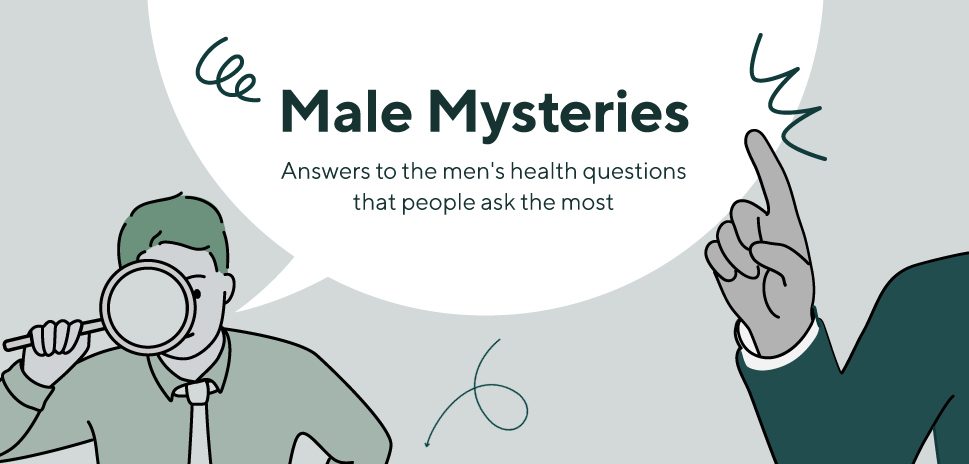
All information has been medically approved by practising GP, Dr Earim Chaudry.
Have you ever typed a question into Google, about sex, male grooming, or even whether briefs are bad for your health, and wondered whether anybody else has shared the same concerns?
Another uncertainty that comes with looking anything up on the internet is that of reliability; are the answers I am getting completely true and science-backed? In reality, unless you visit your GP, there is no way to know for sure – until now.
The experts at Manual have scoured the internet to find the top-asked questions surrounding men’s health and brought a medical professional in to offer their insight. Ranging from skincare to hair loss, Dr Earim Chaudry has got the answers.
What Are The Most Asked Questions About Men’s Health and Fitness?
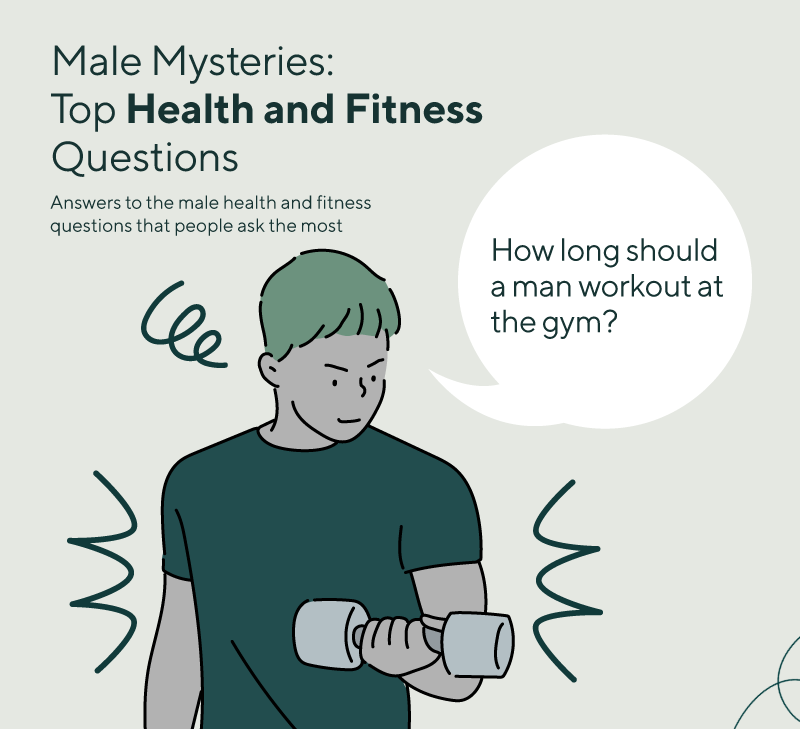
- Why is men’s health worse than women’s?
Despite a Manual study highlighting that, across 156 countries, men’s health was generally poorer, it was not the case for the UK – where it was found that women were physically and mentally thriving less.
However, there are many factors that go into why men’s health is so much worse than women’s across the globe. One significant issue when it comes to mental health is the stigma around males seeking help and seeming weak.
An article by lecturers Adam Stanaland snd Sarah Gaither shone a light on the fact that the pressures of toxic masculinity often led to violence and injury – another aspect that could lead to generally poorer physical health.
A study conducted by Mind revealed that men having suicidal thoughts had doubled since 2009, along with pointing out that men were more likely to get drunk or take drugs to make themselves feel better – putting another significant strain on their health.
- How long should a man workout at the gym?
This depends entirely on what you want to achieve, both physically and mentally. For instance, if you are attending the gym to relax after work and clear your mind, you should exercise for as long as feels comfortable.
However, if you are looking to obtain a particular appearance and build muscle, it is recommended that beginners should spend up to two or three days a week at the gym to notice a visible change.
You also need to balance cardio and strength training, working on either your upper or lower body on different days to avoid injury. Varying the weights will also be beneficial, along with the number of reps you do. The heavier the weights, the fewer reps you should do, and vice versa.
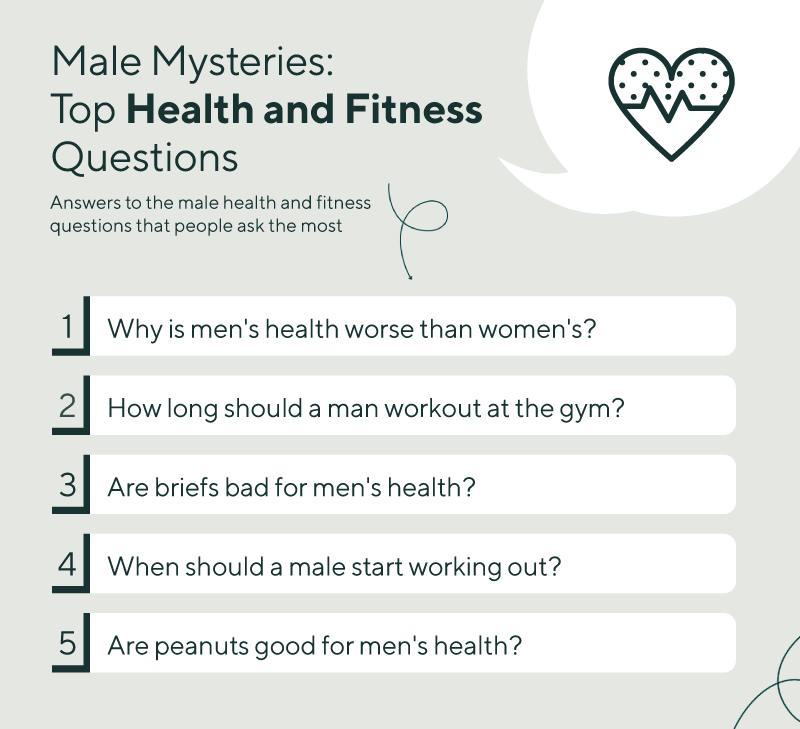
- Are briefs bad for men’s health?
Once again, this depends on what you mean by ‘health’, as wearing tight briefs is mainly not recommended for people trying to conceive.
A video interview with pelvic surgeon and urologist Rena Malik MD highlighted that, while briefs will naturally cause the genitalia to be warmer and more supported, as they are tighter, there really isn’t that much difference to other underwear.
She refers back to a 1998 study conducted by the American Urological Society, which determined that it was ‘unlikely that underwear had any significant effect on male fertility’. My recommendation is to choose underwear that makes you feel comfortable and confident.
- When should a male start working out?
Exercise can happen at any age, as children generally begin to experience the joy of movement as soon as they start crawling. Many parents, however, would not be on board with their children working out in order to achieve a certain body type.
Research shows that children can develop body image issues from as young as three-years-old, making it important to distinguish the difference between exercising for health and aesthetics early on.
Dr Krishan Chugh, paediatrics director at Fortis Memorial Research Institute, Gurugram, revealed that children can technically start working out at the age of eight, when their proprioception (ability to position and balance) is developed. Despite this, Chugh also states that strength-building workouts should be carried out after the age of ten, just to be safe.
- Are peanuts good for men’s health?
Aside from being delicious, there are many reasons why men should be eating peanuts for their health. From being packed with antioxidant-rich vitamin E, along with magnesium and almost seven grams of protein per 28 grams, this nut comes with an impressive list of nutrients.
Peanuts are also loaded with polyunsaturated fats. A University of Harvard study highlighted that replacing a small number of carbohydrates with these fats could actually decrease the chance of heart disease in men by 30% to 40%.
What Are The Most Asked Questions About Men’s Hair?
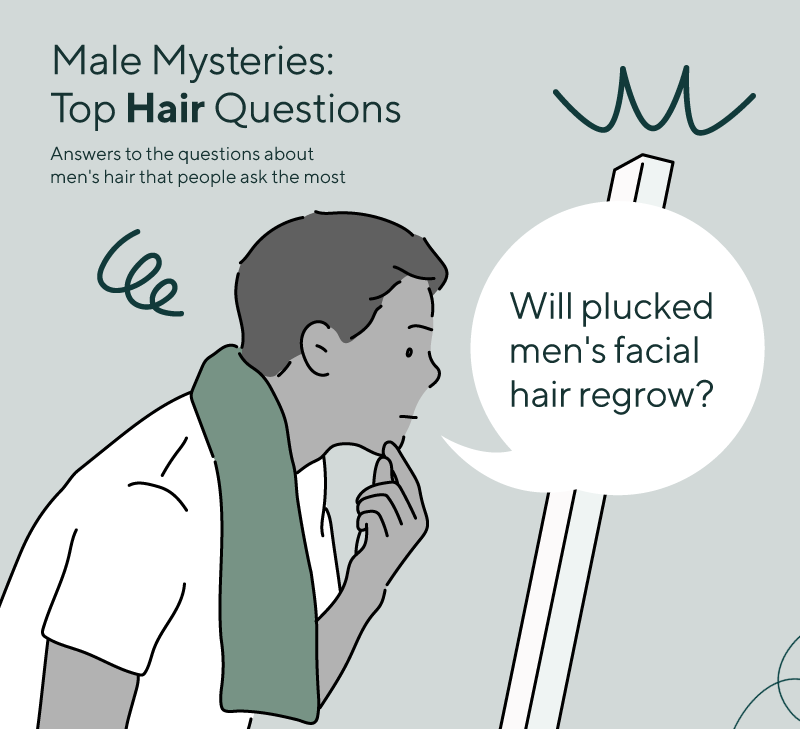
- Why does men’s hair fall out?
The age-old question. This can be down to a number of factors, but the most common reason for male hair loss is male-pattern baldness. Usually caused by genes received from your parents, or being sensitive to the sex hormone dihydrotestosterone (DHT), male-pattern baldness is extremely common and affects 6.5 million men in the UK.
Genetic hair loss is known as androgenetic alopecia. If you are sensitive to DHT, your hair follicles will shrink over time until, eventually, they stop growing. Other causes of hair loss include diseases like alopecia areata and scarring alopecia, which makes your hair fall out and leaves smooth skin behind, or creates scar tissue in its place.
Ageing can cause hair to thin or fall out, which is essentially unavoidable as male hormones change throughout men’s lives. In very extreme cases, stress can cause telogen effluvium, making your hair shed in tufts.
- Why does men’s hair go grey?
All hair goes grey eventually, and this is caused by your hair follicles no longer being able to produce melanin. Melanin adds pigmentation and colour to your hair, skin and eyes, and slows down due to melanocytes in the body decreasing.
These cells are needed to create melanin and are commonly known as specialised skin cells. Lots of men (and women) get grey hair prematurely, but this is more related to genes, rather than loss of melanin.
- Will plucked men’s facial hair regrow?
Although plucking your hair out will prevent it from growing back as quickly as it would with shaving, your hair should still return eventually. It can also be quite dangerous, as plucking in a direction that irritates the follicle could cause it to tear and damage the skin beneath.
If you pluck the hair and manage to remove it from tip to root, the hair should return in around 2-4 weeks. If the hair snaps, it should grow back at the same time that it would if it was shaved off. However, if you distress the ‘bulb’ of the hair by plucking too roughly, your beard hair may struggle to return.
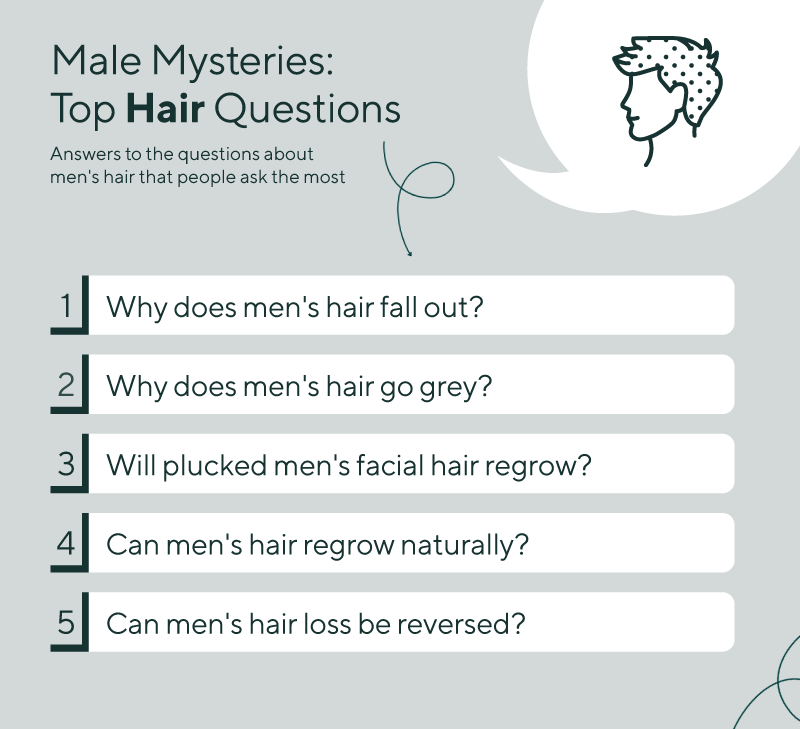
- Can men’s hair regrow naturally?
As discussed in Question 1, this depends on whether your hair has fallen out due to male-pattern baldness, or for another reason. For example, if your hair has fallen out due to an illness, medication, or stress-related issues, it has been said that massage can help it to come back naturally.
Massage works to stimulate blood flow, and has also been said to encourage the growth of dermal papilla cells at the base of the hair follicles. Whether this legitimately works is still undecided.
There are various different oils that have been rumoured to promote the growth of thicker, more lustrous hair, such as coconut oil, aloe vera, ginseng, onion juice, rosemary oil, and many more.
- Can men’s hair loss be reversed?
Minoxidil, a topical treatment for male-pattern baldness, has been shown to be able to promote hair growth after it has been lost. It is most effective when it comes to specific types of baldness.
For example, the medication has the biggest impact on scalps where hair has been recently lost, with the areas towards the back of the head typically responding the best.
It is part of a group of drugs named Vasodilators, which are used to lower high blood pressure by widening the vessels. In short, despite the fact that there are many natural and some medical remedies, hair loss is usually dependent on genetics.
What Are The Most Asked Questions About Men’s Skin?
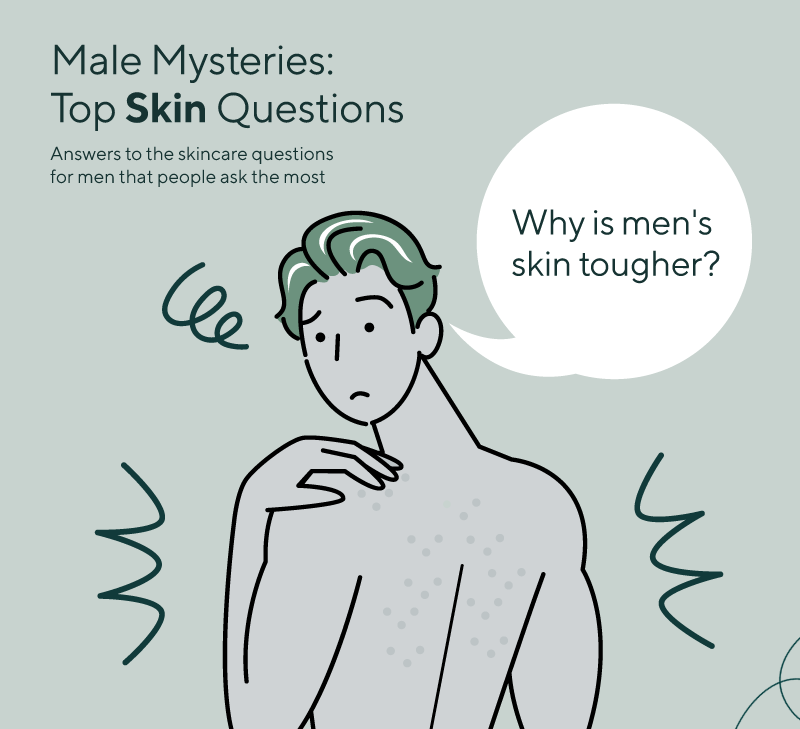
- What should a man’s skincare routine be?
Your skincare routine should cover the basics of cleansing, toning, and hydrating with a serum and a moisturiser. Finally, whatever your sex, you should wear a high-factor SPF every day. If you have naturally oily skin, it could be beneficial to skip your moisturiser and simply use serum and SPF after cleansing and toning, to avoid pores becoming clogged.
While you should aim to do your skincare routine in the morning and evening, many skincare gurus with very sensitive skin have begun skipping their AM cleanse, choosing to use tap water instead to avoid abrasiveness. In order to remove dead and dull skin cells, you should aim to exfoliate two to three times a week.
- How do you make men’s facial skin smooth?
Men tend to have coarser skin than women due to having more hair follicles across their face, which can become clogged with dead skin cells. Testosterone production also causes male skin to be thicker in general, despite the fact that they produce more collagen than women.
Shaving has been proven to be very effective when it comes to maintaining a smooth complexion, as it removes dull skin cells as well as facial hair. If your skin is extremely dry, it could be beneficial to invest in an intensive serum containing hyaluronic acid.
- Does men’s skin age better?
Technically, there is some truth to men’s skin ageing better than women’s. Producing more collagen certainly helps, as it keeps the complexion firm and plump. Men also produce more sebum which, despite potentially clogging the pores and causing blackheads and whiteheads, makes skin dewier and oilier.
However, in 2019, a YouGov study found that 31% of men admitted to not wearing sunscreen when they went out, compared to just 15% of women who went without.
Due to a lot of men in the UK being careless with their SPF use, mortality rates of skin cancer in men have tripled since the 70s, highlighting that despite having a natural advantage, their skin is more at risk without protection.
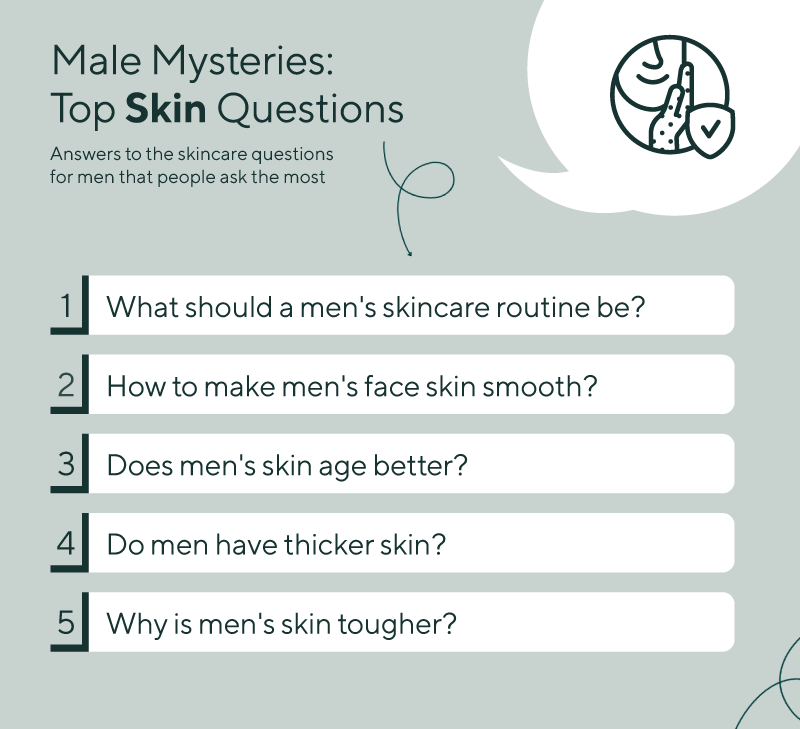
- Do men have thicker skin?
Higher levels of testosterone and sebum mean male skin is a lot thicker than women’s – by about 20 or 30%, which helps to slow down the ageing process. Despite this, it doesn’t mean that men’s skin is less vulnerable to external factors.
According to skincare giant Eucerin, men shave up to 16,000 times in their lives, which removes the top layer of skin and leaves it exposed to the elements. This can cause it, despite being thicker, to become irritated and inflamed.
- Why is men’s skin tougher?
While this is true, it has been highlighted that men lose collagen faster throughout their youth, while women tend to hit a steep decline when they hit menopause.
Because of this, men are more prone to deep-set wrinkles, while women are more likely to have fine lines all over their faces.
The thickness of a woman’s skin will usually be maintained until middle age, while male skin, despite being thicker at the dermis, is thinning constantly, slowing down once they hit their 40s.
What Are The Most Asked Questions About Men’s Wellbeing?
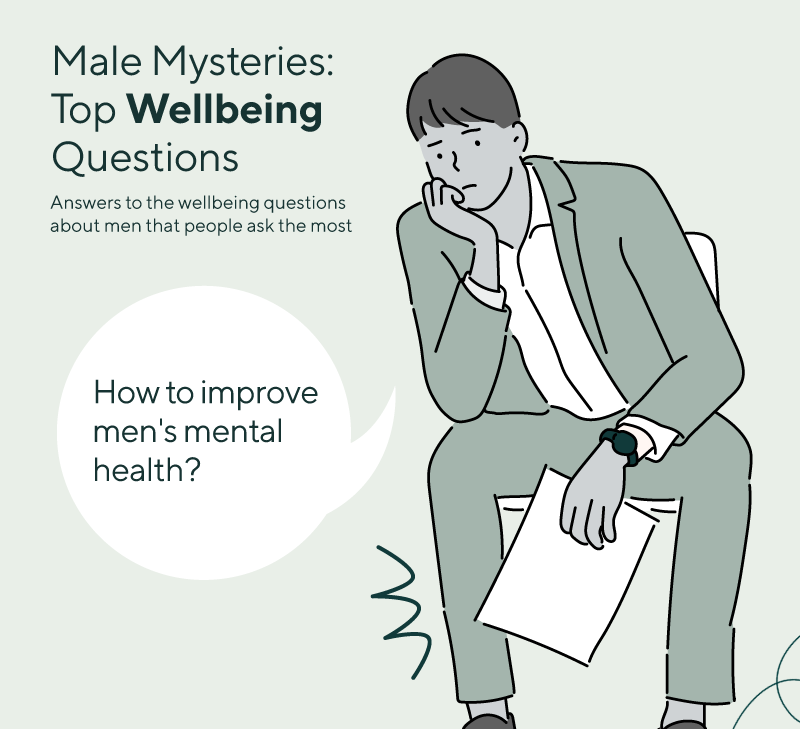
- What happens to a man at 45?
Many people refer to this stage in a man’s life as the ‘male menopause’. Around this age, men could start experiencing a lower sex drive, a loss of energy, memory loss, and fat redistribution. Despite many people assuming this is due to a lack of testosterone, similar to the female menopause is due to a decline in estrogen, this is not the case.
While a drop in testosterone levels can be caused by late-onset hypogonadism, these symptoms are typically caused by issues such as stress, mental illness, an unhealthy lifestyle, or sleep issues.
- Is men’s mental health ignored?
Priory, an addiction treatment centre, highlighted in 2015 that 16% of men thought having mental health problems ‘made them feel weak’. Despite this study being conducted several years ago, the information remains relevant – shining a spotlight on the stigma surrounding male mental health issues.
Three times as many men as women commit suicide in the UK, and only 36% of NHS talking therapy referrals are requested by men. It is a truth universally acknowledged that, historically, men have been the breadwinners while women stayed at home to raise a family.
While power dynamics have thankfully changed, the idea of male dominance within the patriarchy remains. Verso Books refers to the theory of ‘male dominance as a ‘historical phenomenon’, which still to this day contributes to the ideology that men are weak for expressing their feelings, leading them to feel that their mental health is ignored by society.
- How to improve men’s mental health?
The Mental Health Foundation highlights that the ways men can improve their mental health are similar to the suggestions generically proposed for women, such as reaching out to people and maintaining their everyday routine.
While these things are important, it is also crucial to tear down the stigma that surrounds male mental health, by raising awareness of the fact that men struggle internally too.
Occasions like November being hailed as Men’s Mental Health Awareness Month help to shine a light on the need for men to talk as well as women, which will hopefully continue to encourage widespread change.
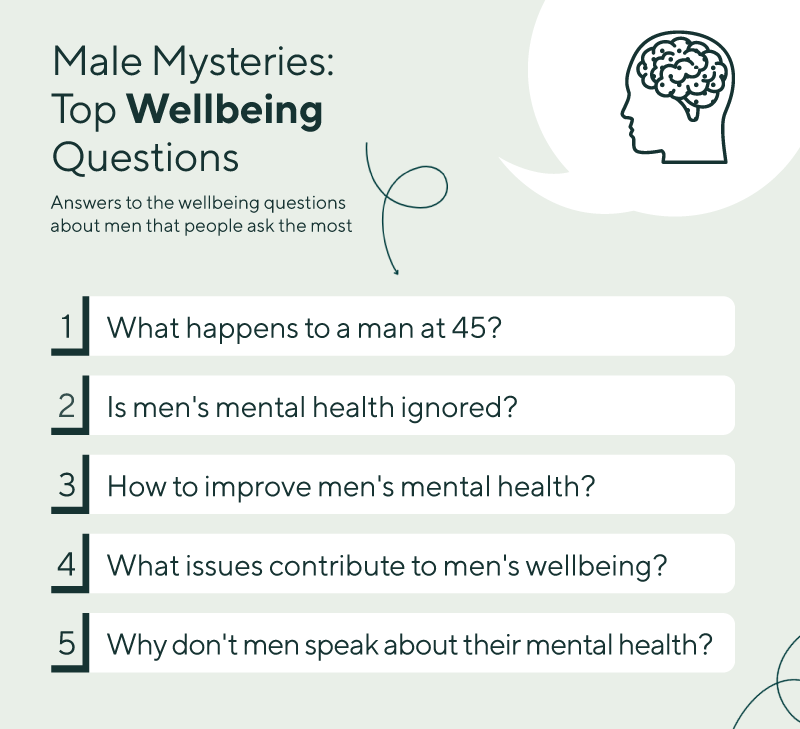
- What issues contribute to men’s wellbeing?
The Office for National Statistics revealed that men were ‘twice as likely to have taken any drug’ than women, and with The Mental Health Foundation stating that ‘all drugs can have an effect on your mental health, it could be suggested that a lot of men in the UK were turning to substances rather than seeking help.
This, in the long-term, would have a profound impact on your overall wellbeing as a man, along with the constant pressure to appear ‘tough’ or ‘overly masculine’. Focus groups in the UK held by The Conversation revealed that many of their peers pressurised them to be ‘protectors’ and to also ‘look good’, with some feeling obligated to work out when they didn’t want to.
YouGov stated that 27% of men in the UK in 2021 felt ‘pressure’ to have a particular type of body, which is not helped by the very rare representation of ‘realistic’ male bodies. For instance, with TV shows like Love Island and Too Hot to Handle portraying only one body type (extremely lean and muscular), it may be unsurprising that many men are left feeling low.
- Why don’t men speak about their mental health?
One of the main issues surrounding the prejudice around male mental health is that of many people in the public eye promoting ‘toxic masculinity’ and the idea of the ‘alpha male’.
For example, many modern authors refer to themselves as ‘masculinists’ (the opposite of a feminist), and profit from books which encourage men to fight against things like “‘effeminacy”, feminism, and weakness’. They even highlight that men should resort back to their ‘primal instincts’ and only act as breadwinners and providers for women.
Another contributor could be the bombardment of toxic masculinity and ‘what a man should be’ on social media, such as endless examples of ‘alpha males’ on Instagram and TikTok, wielding weapons and flexing their muscles.
Men’s Health even created a top ‘alpha males to follow on Instagram’ listicle, despite many of their examples being described as ‘modern misogynists’. With men like this rife on our screens and constantly hailed as what males should aspire to be like, emotions and mental health can be forgotten.
What Are The Most Asked Questions About Grooming For Men?
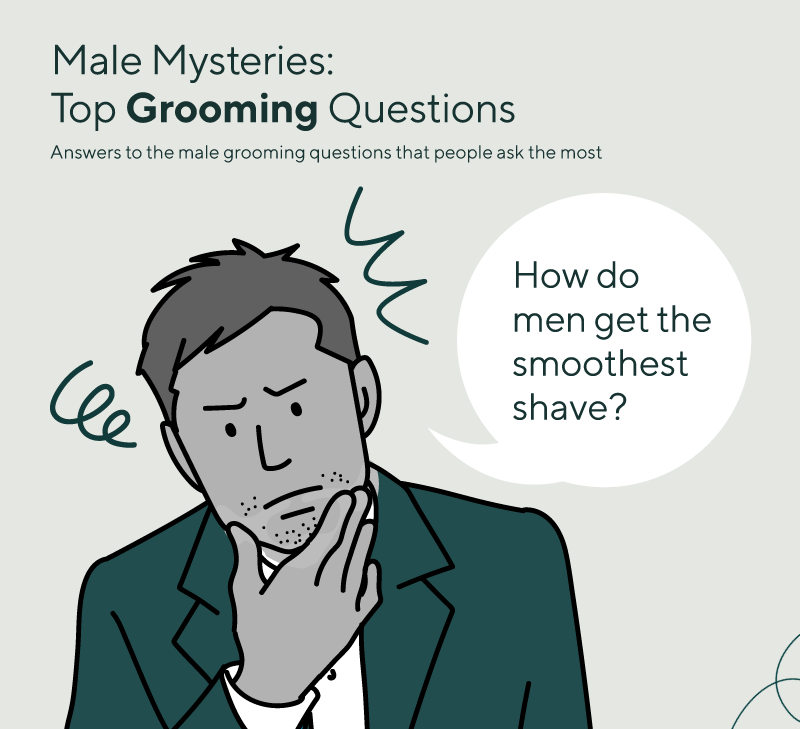
- Why do men grow facial hair?
People assigned male at birth grow facial hair due to a hormone known as DHT (dihydrotestosterone) which is created by testosterone. Men and women both have the same number of hair follicles on their faces but, as women do not produce as much testosterone as men and their hair follicles aren’t as stimulated by DHT, they do not usually grow beards.
- Why do men shave their heads?
There are many reasons why a man might shave his head – the main one being that he might just like the look of it. Many actors, from Jason Statham to Vin Diesel, have shaved heads, causing a lot of men to follow suit.
Another reason could have been the coronavirus pandemic. With so many people trapped in their houses for uncertain amounts of time, it led to lots of men grabbing their razors as they could not get to their usual barber shops.
Finally, a man might shave his head if his hair begins to recede naturally. If a man’s hair begins to recede from the front, he may want to take the initiative and get rid of all of it before the inevitable happens.
- How can a man shave his private area?
If a man is aiming for more of a groomed appearance, then he needs to make sure he exfoliates before shaving to prevent any ingrown hairs. Ingrown hairs can be caused by the hair follicle becoming blocked, due to excessive shaving causing the hair to become so weak that it can no longer penetrate the skin.
A very close shave can also cause the tip of the hair to become extremely sharp, making it likely that it will curl back into the skin. Exfoliation helps to remove dead skin which can cause build-ups of dull cells, which makes it easier for hairs to grow out of the skin.
Always apply a barrier and shave in the direction that the hair is growing, never against the grain, as this will cause inflammation and irritation. Once finished, make sure the area is kept hydrated.
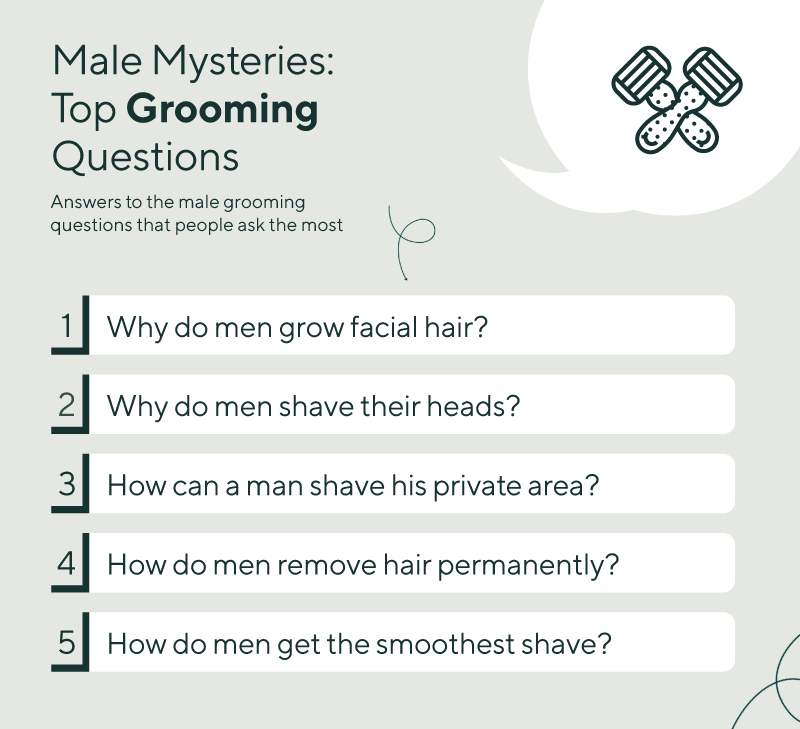
- How do men remove hair permanently?
One of the best ways to remove hair is to have it lasered off. The clever technique uses concentrated light to target the hair follicle at the root, making it near impossible for the hair to break through the skin. This allows it to be less damaging and more permanent than shaving, which can cause irritation and ingrown hairs.
Another way to get rid of hair forever is to use Electrolysis, which involves utilising chemical or heat energy to destroy the hair’s ability to grow. A probe is placed into the hair follicle to remove the hair at the root, making this method one of the most permanent available.
- How do men get the smoothest shave?
A surefire way to encourage a rough, coarse shave is to use a blunt razor. Always ensure that your razor is sharp enough to glide across the skin, while also using a foam, or some kind of liquid barrier to protect the skin. Try to refrain from dry shaves, as this will inflame the skin and promote the growth of ingrown hairs.
What Are The Most Asked Questions About Men And Sex?
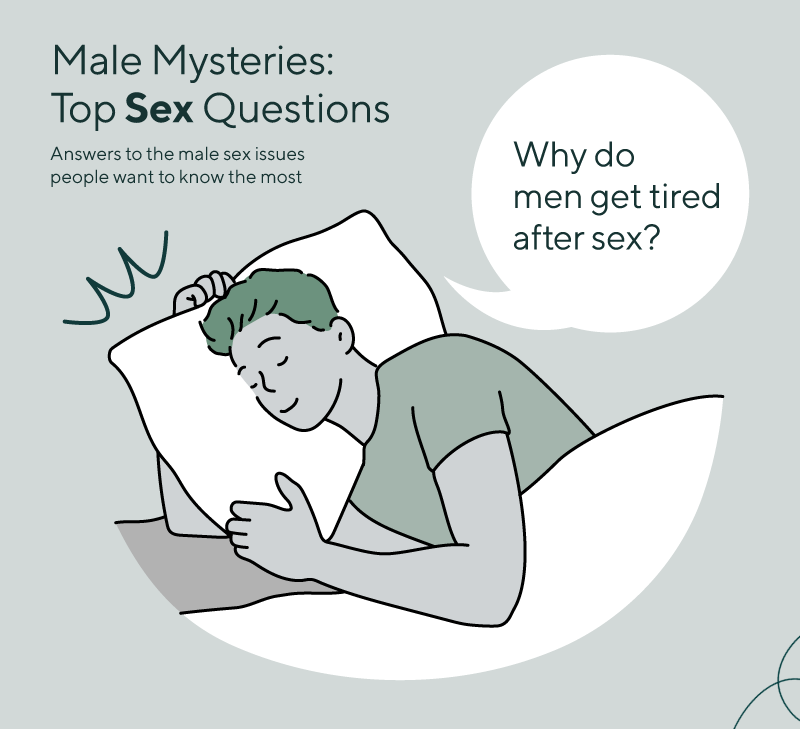
- Why do men get morning wood?
When you wake up in the morning, your levels of testosterone are at their highest. When you are awake and engaging in day-to-day activities, your brain is constantly releasing hormones to stop you from getting an erection – but when you are asleep, your brain stops.
Testosterone levels reach their peak right after REM (rapid eye movement) sleep, meaning that you could still have an erection after this, even if you haven’t had any erotic dreams. Most of the time, having an erection in the morning isn’t due to having dreams of a sexual nature at all – despite the fact a 2007 sleep study highlighted that at least 8% of dreams are sexual.
- Why do men get tired after sex?
Men typically get very tired after sexual intercourse and ejaculation due to a biochemical known as prolactin being released. It has also been suggested that glycogen, which promotes energy, is lessened during intercourse, especially if the man has physically exerted himself. This was discovered by Mark Leyner and Billy Goldberg, M.D.
As research has shown that men and women both feel that men are more ‘entitled’ to orgasms during sex, they are more likely to be fatigued than a woman that has not reached her climax yet.
Oxytocin, which is responsible for positive feelings, is also released during sex, which in turn could lessen feelings of anxiety or worries about the next day that could prevent a restful night. The prefrontal cortex of the brain, which is in charge of alertness, has also been shown to shut down after ejaculation, which would make it a lot easier to sleep.
- How long can the average man stay erect?
This varies from person to person, and can also be impacted by medication or mental health issues. However, the average time that a man can sustain an erection has been said to be around ten minutes.
Your age can also be relevant when it comes to how long you can stay erect, as well as your lifestyle. For example, if you are a heavy smoker or drinker, you may find it more difficult to stay erect.
As well as this, despite many singers in the charts claiming that they can ‘keep it up all night’, having an erection for up to four hours is known as priapism and is a medical emergency. This condition, in very rare cases, can be caused by medications like viagra being taken alongside another drug for erectile dysfunction. It has also been linked to people that have suffered spinal cord injuries.
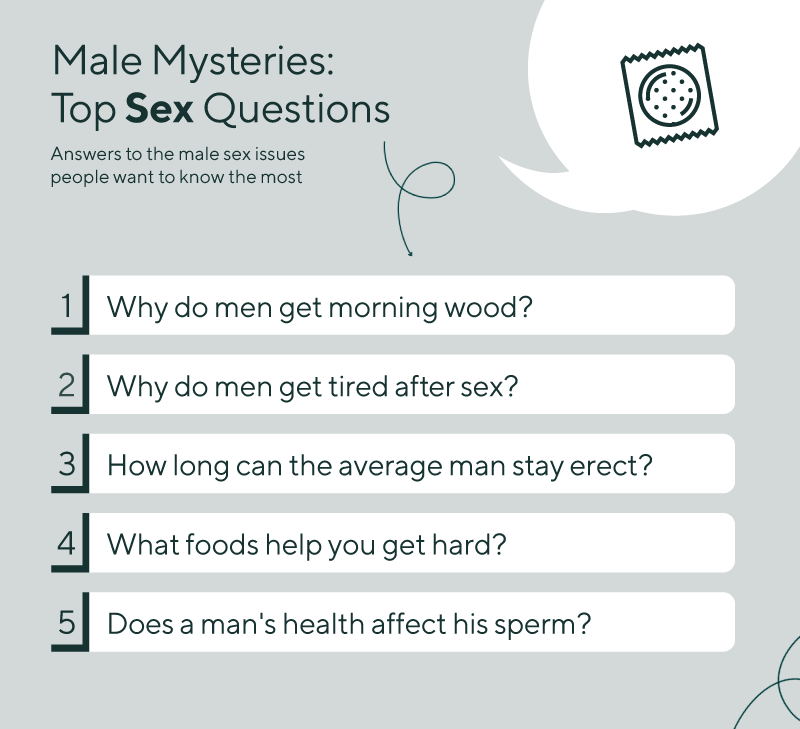
- Which foods help you get hard?
Blood vessels in the penis can get clogged just like anywhere else, which is why it can be important to limit the amount of greasy food you eat, as it could be impacting your ability to maintain an erection.
While there is no proof that any of these foods can genuinely help a penis to become erect, rumours have swirled for decades about the sexual health benefits of watermelon. It is boosted by an amino acid known as L-citrulline, which is also found in pumpkin and cucumber, and has been said to encourage optimum ‘hardness’.
Fruits like oranges and blueberries are also rich in plant pigments known as flavonoids, which have also been shown to lessen the symptoms of erectile dysfunction. Coffee has also been revealed to help to relax the blood vessels in your penis, making it a lot easier for blood to flow to it.
Finally, nuts such as pistachios have also been found to reduce the chances of erectile dysfunction, as they are boosted by antioxidants and arginine. These also help to widen the blood vessels in the penis, which is known as vasodilatation.
- Does a man’s health affect his sperm?
The very short answer to this is yes, especially things like smoking or drinking alcohol. The NHS states that these factors can directly reduce a man’s ability to be as fertile as possible, and should be stopped immediately if becoming a father is the overall goal.
Drugs, recreational or over the counter, can also reduce your chances of getting somebody pregnant – even things like anti-biotics can lessen the quality of your sperm. As well as this, having a healthy, balanced diet has been said to improve the quality of sperm, as many nuts, greens, and fruits have sperm and erection-enhancing properties.
Getting older also has an impact on sperm, as a man’s sperm count decreases as he ages. This may be more obvious, but having illnesses, especially sexually-transmitted ones like chlamydia or gonorrhoea, can reduce your chances of being fertile – and even cause infertility.
Finally, if your job involves chemicals like pesticides or even household ones, it is crucial to make sure you wear a protective covering if you are trying for a baby. If you work on a farm, as a painter or decorator or even as a cleaner, chemicals are everywhere and can have a large impact on the quality of your sperm.
While we've ensured that everything you read on the Health Centre is medically reviewed and approved, information presented here is not intended to be a substitute for professional medical advice, diagnosis, or treatment. It should never be relied upon for specific medical advice. If you have any questions or concerns, please talk to your doctor.



